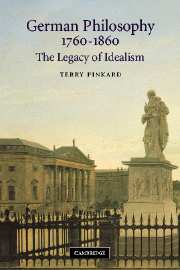Book contents
- Frontmatter
- Contents
- Acknowledgements
- List of abbreviations
- Introduction: “Germany” and German philosophy
- PART I KANT AND THE REVOLUTION IN PHILOSOPHY
- PART II THE REVOLUTION CONTINUED: POST-KANTIANS
- PART III THE REVOLUTION COMPLETED? HEGEL
- PART IV THE REVOLUTION IN QUESTION
- Introduction: exhaustion and resignation, 1830–1855
- 12 Schelling's attempt at restoration: idealism under review
- 13 Kantian paradoxes and modern despair: Schopenhauer and Kierkegaard
- Conclusion: the legacy of idealism
- Bibliography
- Index
Introduction: exhaustion and resignation, 1830–1855
Published online by Cambridge University Press: 05 June 2012
- Frontmatter
- Contents
- Acknowledgements
- List of abbreviations
- Introduction: “Germany” and German philosophy
- PART I KANT AND THE REVOLUTION IN PHILOSOPHY
- PART II THE REVOLUTION CONTINUED: POST-KANTIANS
- PART III THE REVOLUTION COMPLETED? HEGEL
- PART IV THE REVOLUTION IN QUESTION
- Introduction: exhaustion and resignation, 1830–1855
- 12 Schelling's attempt at restoration: idealism under review
- 13 Kantian paradoxes and modern despair: Schopenhauer and Kierkegaard
- Conclusion: the legacy of idealism
- Bibliography
- Index
Summary
Hegel died suddenly and unexpectedly on November 14, 1831 in the midst of an outbreak of cholera in Berlin. (Although Hegel's death was attributed to cholera at the time, it was almost certainly from other causes.) The intellectual community in Berlin was stunned; even his detractors admitted that one of the leading intellectual lights had vanished. His friends and students had, within the month, formed an association dedicated to bringing out his complete works, including his famous lecture series on philosophy of religion, philosophy of art, philosophy of history, and the history of philosophy, along with annotations of his Encyclopedia of the Philosophical Sciences gathered from Hegel's own lecture manuscripts and notes taken by students. Hegel left behind a dedicated cadre of students not only in Germany but also in England, France, Russia, Italy, and elsewhere. Four months later, March 22, 1832, Goethe died. Symbolically, at least, an era of German thought ended.
Although neither Hegel's nor Goethe's deaths were any way decisive for what came later, the timing of their deaths in fact coincided with a shift taking place in Germany that was crucial for the development of post-Kantian philosophy through the 1830s until the end of the 1850s. After Napoleon's defeat at Leipzig in 1813 and his abdication in 1814, the reigning powers in Germany attempted to reestablish much of the pre-Napoleonic order.
- Type
- Chapter
- Information
- German Philosophy 1760–1860The Legacy of Idealism, pp. 306 - 316Publisher: Cambridge University PressPrint publication year: 2002

